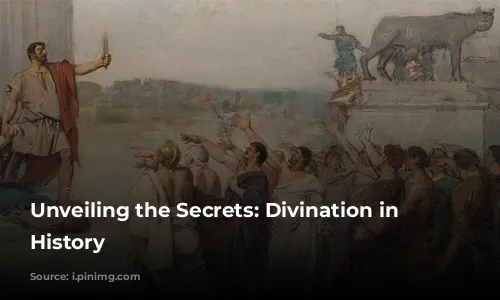This article delves into the fascinating world of divination in ancient Rome, exploring its role in shaping historical narratives. We’ll journey through the writings of renowned Roman historians Livy and Tacitus, uncovering how they employed divination to craft compelling and purposeful accounts of Rome’s past.
Defining Divination: A Look at Practices and Beliefs
Our exploration begins with a closer examination of divination itself. What did it entail? What types of diviners and supernatural signs were recognized in Roman society? We’ll uncover the intriguing distinction between divination sanctioned by the Roman state and those practiced by individuals in their personal lives. This investigation offers a glimpse into the complex and often contradictory nature of divination in ancient Rome.
A comprehensive dictionary of divinatory terms is provided in the appendix, offering a valuable resource for further exploration.
Beyond the realm of specific practices, we’ll delve into the contemporary academic landscape, examining existing scholarship on divination and its connection to Roman historiography. This analysis will focus on four key areas: the nature of divination, the art of historical writing, and the unique approaches of Livy and Tacitus.
Finally, we’ll delve into the groundbreaking work of Feeney (1998) on literature and religion in Rome, highlighting the crucial role of divination as a literary tool that could enhance the historical objectives of Livy and Tacitus.
A World of Diviners: Exploring Roman Attitudes and Practices
Chapter Two delves into the vibrant world of Roman divination, showcasing the diverse practices and beliefs that flourished from the late third century BC to the early second century AD. We’ll encounter a thriving marketplace of diviners, eager to offer their services to the Roman people, providing an alternative to the more structured practices of the Roman state. This competitive landscape demonstrates the plurality of approaches to divination, even as figures like Varro and Cicero attempted to define a “traditional” Roman approach.
While some forms of divination, such as astrology, were viewed with skepticism, their allure was undeniable, attracting both members of the Roman elite and the common folk. This widespread interest paved the way for Augustus to skillfully incorporate astrological elements into his religious “revival” without causing widespread offense. Despite this evolving landscape, the enduring significance of “traditional” Roman practices is undeniable.
This chapter underscores the complex tapestry of divination in Rome, suggesting that different types of practices co-existed, challenging the narrative of a strictly defined “traditional” Roman approach. This insight offers a nuanced perspective on how Livy and Tacitus may have presented a “traditional” view of Roman divination, potentially obscuring the rich tapestry of practices that existed in their time.
The Power of Prophecy: Understanding Divination in Livy and Tacitus
Chapter Three delves into the motivations behind Livy and Tacitus‘s inclusion of divinatory elements in their historical narratives. We’ll explore the influence of poetic, dramatic, and rhetorical traditions on Roman historiography, highlighting the importance of “inventio” – the process of finding and developing persuasive material for a historical narrative.
Both Livy and Tacitus were deeply influenced by the “annalistic tradition,” a historical writing style that emphasized the inclusion of prodigies, religious events, and divinatory occurrences. This tradition, while recognizing the potential dangers of fabricated stories, provided historians with powerful tools for shaping their narratives.
Livy’s Legacy: Using Divination to Shape Rome’s Story
Chapter Four unveils the masterful use of divination by Livy in his historical works. We’ll examine how he employed divinatory elements in Books 1 and 5 to emphasize the significance of Roman divinatory institutions and the strength of Rome’s connection to the gods.
Livy skillfully uses prophecy to guide his readers towards the glory of the Roman Republic during its middle years. The Third Decade echoes themes from the early books, highlighting Rome’s growing dominance over the Mediterranean. However, Livy also uses divination to depict a sense of decline starting with the Fourth Decade.
Drawing upon Iulius Obsequens’s “Liber Prodigiorum,” we’ll explore how this trend of decline may have continued into the lost later books of Livy’s work. He might have aimed to bring his narrative full circle, showcasing the success of Augustus’s religious revival by intentionally echoing themes from Book 1**.
We’ll conclude this chapter by analyzing the specific types of divination that Livy chose to include or exclude in his narratives. This analysis underscores the emphasis he placed on traditional divination, reflecting the antiquarian nature of his work. Livy also skillfully used divination to highlight the superiority of Roman divination over those practiced by other nations and individuals.
Tacitus’s Masterful Use of Divination
Chapter Five explores how Tacitus adapted Livy’s annalistic style to suit his own imperial historiography. We’ll begin by examining Tacitus’s approach to prodigies – ominous signs or events – demonstrating how he used them effectively as dramatic elements in his writing.
Similar to Livy, Tacitus contrasted foreign and private forms of divination with those practiced by the state, adhering to the traditions of the annalistic style. But when it comes to his “Histories” and “Annals,” we’ll discover that Tacitus surpasses Livy in his use of divination for heightened drama, characterization, and emphasis.
This article reveals the crucial role of divination in shaping Roman history, illuminating how Livy and Tacitus used it as a powerful tool to craft their narratives. It also provides a deeper understanding of the diverse practices and beliefs that shaped the Roman world. By exploring the fascinating intersection of history, religion, and literature, this article sheds light on the rich tapestry of Roman culture.
